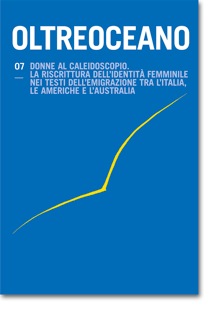L’ossessione autobiografica. Zelia Gattai e la scrittura della migrazione
Keywords:
migrazione italiana, donna-scrittrice, autobiografiaAbstract
Scopo di questo articolo è presentare un panorama storico e narrativo della migrazione italiana e, in particolare, della donna-scrittrice, emigrata e residente in Brasile a partire dagli anni Venti del secolo scorso. Per addentrarci nella proposta teorica della migrazione e dei suoi materiali plurilinguistici e pluriculturali che da essa emergono, ci serviremo dei volumi autobiografici della moglie del ben più noto Jorge Amado, Zélia Gattai, a cominciare dal primo celebre volume, Anarquistas, graças a Deus.
Autobiographical Obsession. Zelia Gattai and Migration Writing
The aim of this article is to introduce a historical and narrative panorama of Italian migration – in particular that of a woman writer emigrated to Brasil in the nineteen-twenties. To try and face the theoretical question of migration and of its multilinguistic and multicultural aspects, we shall deal with the autobiographical writings of Jorge Amado’s wife, Zelia Gattai and her first celebrated novel Anarquistas, graças a Deus.
Downloads
References
Alvim, Z. (1986): Brava gente! Os italianos em São Paulo. São Paulo: Brasiliense.
Barthes, R. (1984): Le bruissement de la langue. Essais critiques IV. Paris: Seuil.
Block de Behar, L. (1994): Una retórica del silencio. Funciones del lector y procedimientos de la lectura
literaria. México: Siglo XXI.
D’Angelo, B. (2010): Il museo della memoria. Juó Bananere e la cultura italiana in Brasile. In S. Serafin (Ed.), Historias de emigración. Italia y Latinoamerica (pp. 19-31). Venezia: Studio LT2.
Didier, B. (1976): Le journal intime. Paris: PUF.
Foucault, M. (1998): Archivio Foucault. Interventi, colloqui, interviste. III. 1978-1985. Estetica dell’esistenza, etica, politica. A. Pandolfi (Ed.). Milano: Feltrinelli.
Gattai, Z. (2009): Anarquistas, graças a Deus. São Paulo: Companhia das Letras.
Gattai, Z. (1982): Um chapéu para viagem. São Paulo: Círculo do Livro.
Lara, C. de (1981): António de Alcântara Machado: experimentação modernista em prosa. Tese de Livre Docência. Universidade de São Paulo: FFLCH-USP.
Lara, C. de (Ed.), (1997): Pressão afetiva e aquecimento intelectual, cartas de António de Alcântara Machado a Prudente de Morais, neto. São Paulo: Giordano / Lemos.
Machado de Assis, J. M. (2000): Dom Casmurro. São Paulo: Ática.
Madame de Sévigné (1846): Lettres choisies. J-B. Suard (Ed.). Paris: Libraire de Firmin Didot.
Mildonian, P. (2001): Alter ego. Racconti in forma di diario tra Ottocento e Novecento. Venezia: Marsilio.
Zambrano, M. (1995): La confesión: género literario. Madrid: Siruela.
Zeni, B. (2001, junio): Alcântara Machado, inventor de São Paulo. Revista Cult, 47, pp. 45-50.
Downloads
Published
How to Cite
Issue
Section
License

This work is licensed under a Creative Commons Attribution-NonCommercial-ShareAlike 4.0 International License.
The authors undertake to comply with the following conditions, which are considered accepted at the time of submission of their contributions.
The sending of a text implies that it is unpublished and not submitted to be published elsewhere.
1. If accepted, the author shall confer on the publisher the right to publish and distribute it both in paper form and in the online electronic edition. The published articles will be downloadable and made available in open access.
2. Provided that it correctly indicates that the first publication took place in the journal Oltreoceano. Rivista sulle migrazioni the author has the right to: a) reproduce the article in separate extracts or collected in a volume; b) publish the article on their personal website or teaching site provided that these sites are of a non-commercial nature; c) deposit the article in online archives of a non-commercial nature, linked to the institution they belong to or as part of projects for the non-commercial dissemination and open access of scientific works.
The use of contributions by third parties, for commercial or otherwise unauthorized purposes, is not allowed. The publisher declines all responsibility for the unauthorized use of the material published in the journal.












